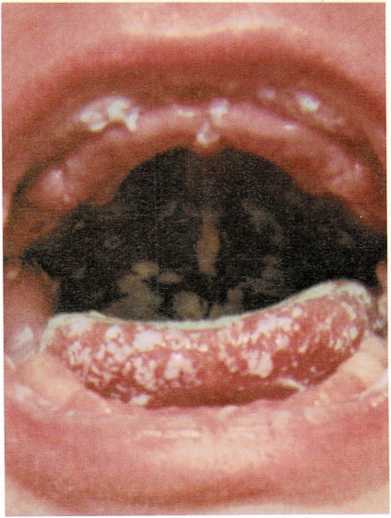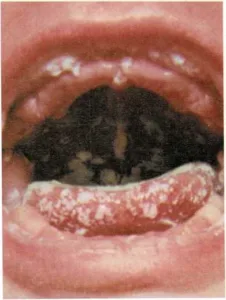Tetanus – Tics
Tetanus (lockjaw) is an acute infectious disease that causes muscle
spasms and convulsions. The spasms of the jaw muscles make it difficult
to open the mouth, which is why this disease is called “lockjaw.” Spasms
may also occur in other muscles. If you suspect that your child has
tetanus, call your doctor at once.
Tetanus is caused by bacteria that produce a powerful poison as they
grow. Because the tetanus bacilli cannot grow if they are exposed to
oxygen, they settle in deep tissue pockets where there is no oxygen.
Tetanus most often develops in puncture wounds, or in children with
great tissue destruction.
Tetanus bacilli live in the intestines of domestic animals and infect
the soil touched by the animal droppings. A child may step on the
droppings and pick up the bacilli, but the bacilli remain harmless until
they are earned deep into the tissues, usually by way of a puncture
wound. For this reason, if your child has a puncture wound, or a cut
that does not bleed readily, consult your doctor. In the meantime, clean
the wound and cover it.
The best protection against tetanus is tetanus toxoid, a vaccine. It is
usually given to babies in a DPT shot (combined diphtheria and tetanus
toxoids, and pertussis vaccine). Children 6 years old or less are given
two shots about two months apart, and a
third shot a year after the second. Ideally, these shots are given
during infancy. A booster, usually as a DPT shot, is given when the
child enters school. If a serious injury occurs before the DPT shots are
completed, a tetanus booster is given.
A nonimmunized school-age child should get two Td shots (combined
tetanus and diphtheria toxoids) two months apart, with a third shot six
months to a year later, and a Td booster every 10 years thereafter.
Tetanus toxoid is almost 100 per cent effective in preventing tetanus.
Tetanus immune globulin (human) should be used to treat tetanus,
[h.d.r..] Jr.
See also Bites and stings; Cuts and scratches; Immunization; Shots
Thermometer. See Fever
Thrush is a mild fungus infection of the mouth. White patches that
look somewhat like milk curd form on the inside of the cheeks, the roof
of the mouth, and the

A thrush infection produces white patches on the inside of a baby\’s
mouth.
tongue. But unlike milk curd, these patches do not wash away with a
drink of water. Do not rub the patches, because the skin will bleed. The
baby’s mouth is usually sore, and the baby may be uncomfortable when
eating. Diarrhea may accompany thrush.
Thrush is not uncommon during a baby’s first few weeks of life. It is
often contracted during delivery from a fungus infection in the mother’s
vagina.
If you suspect that your baby has thrush, consult your doctor for
diagnosis and proper treatment. The doctor will probably prescribe
medication that can be swabbed on the patches in the baby’s mouth after
the baby has been fed. Until you can reach the doctor, give the baby
cooled boiled water after the baby drinks milk. The water will wash the
milk out of the baby’s mouth, giving the thrush fungus less to live on.
mm.. Jr.
See also Diarrhea
Thumb-sucking, for an infant, is almost as natural as eating.
Sucking is itself a drive, a basic need. Babies can receive food only by
sucking. But some babies have a greater tendency to suck their thumbs
than others do. Even though satisfied at the breast or bottle, they seem
determined to get further gratification by sucking fingers or thumbs.
Persistent thumb-sucking is normal in babies. However, parents still
often worry. If they are worried, they may ask themselves a few simple
questions.
Is my baby being cuddled enough? Most babies want to be held at times,
rocked and snuggled and sung to now and then.
Is the baby bored? Perhaps the baby spends too much time alone in the
crib or playpen and has too few objects to handle and explore. Boredom
is as real to a crawler as it is to an adult.
After a child is a year or so old, the sucking need becomes less
powerful. Thumbsucking may be a carry-over response to hunger or a way
for the child to get to sleep. Often thumb-sucking stops as sleep habits
change. If the thumb-sucking persists after the age of 2, it is
evidently satisfying some further, unexplained need. Perhaps a new baby
in the family has made the child want to be a baby again. Perhaps the
child
is shy when pressured too much by adults or when confronted with new
playmates. Perhaps thumb-sucking is a way to feel less lonely, or
perhaps only a request to be hugged.
Do not be upset if others point out that they did not let their children
become thumb-suckers. Let your child alone. Do not talk about the
child’s thumb-sucking, and certainly do not nag, punish, or humiliate
the child because of it.
Do not put distasteful substances on the thumb to discourage
thumb-sucking, and do not use mechanical restraints. Unless there are
problems that cause a child undue tensions, the child will generally
discontinue thumb-sucking.
One of your biggest worries about thumbsucking may be the effect it will
have on your child’s teeth and jaw formation. In some cases, prolonged
thumb-sucking past the age of 5 can interfere with normal dental
development. If you have any concerns, you should consult your dentist,
[m.g.]
Tick bites. See Bites and stings
Tics are uncontrollable spasms of certain muscles. A child with a
tic may repeatedly blink the eyes or shrug the shoulders. The child may
cough, sniffle, or mumble words (verbal tic). Cheek muscles may twitch;
the neck may jerk to one side or the other, or, in unusual instances,
the child’s entire body may jerk. Both motor and verbal tics occur in
Tourette’s syndrome. Tics usually occur more frequently and are more
noticeable when the child is tense or emotionally upset.
If your child has a tic, consult a doctor.
Do not try to force the child to stop the movements. The child does not
have voluntary control over the muscle spasms causing the tic, and
pressure only tends to make the tics worse, [m.g.]
See also Chorea

